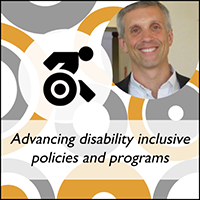Faire progresser les politiques et les programmes inclusifs du handicap

![]() Faire progresser les politiques et les programmes inclusifs du handicap: Expérience du Center for Inclusive Policy et recommandations sur la manière de garantir le droit à la santé pour tous
Faire progresser les politiques et les programmes inclusifs du handicap: Expérience du Center for Inclusive Policy et recommandations sur la manière de garantir le droit à la santé pour tous
Over a billion people—including one in every five women globally—live with some form of disability. They are more likely to face poverty; experience violence; be denied health care, l'éducation, and employment. Excluded from participating in and contributing to their communities, many disabled people have little or no voice in the personal, social, and political decisions that directly affect their lives.
Avoidable barriers to accessing health services and participating in health decision-making:
|
Despite representing the world’s largest minority group, public health policies and programs routinely overlook disabled people. Many of the apparent population health gains in low- et intermédiaires (PRITI) mask significant gaps in the ability of people with disabilities to receive quality health services they want and need, when and where they need them—widening what The Lancet has called a ‘disability and development gap.’ As a result, disabled people experience greater unmet health needs, greater health risks, and poorer health outcomes than non-disabled people. This exclusion has a ripple effect on the lives of disabled people and their families, hindering their participation in education, employment, and community and public life.
Disability should not be viewed as a medical issue, but as a human rights issue. As WHO recognizes, people are disabled by society, not just by their bodies. The health inequities faced by disabled people stem from how the health system is organized, how healthcare is delivered, how power is distributed over health decision-making, and poorly informed social norms about disability.
Many of these inequities are avoidable and must be overcome with inclusive policies and rights-based health and development programming. Widespread ratification of the UN Convention on the Rights of Persons with Disabilities, as well as the SDG’s focus on leaving no one behind, have increased interest in developing inclusive policies in LMICs and opened up new avenues for disabled people to impact decision-making and gain access to their rights, including their right to health. Malheureusement, many national policy-makers and advocates—including newly appointed government focal points for disability and representatives of Organizations of Persons with Disabilities (DPOs)—require improved capacity in policy analysis needed to make the most of this momentum.
Management Sciences for Health (MSH) is partnering with The Consortium for Building Inclusive Societies (CBIS), a group of recognized leaders in the disability rights movement, to raise awareness to these issues.
The Center on Inclusive Policy (CIP), a member of CBIS, is working alongside policymakers and disabled leaders to advance inclusive policy-making through:
- Supporting the development of tailored training programs
- Increasing the quality of data analysis for policy design and monitoring
- Enabling constructive exchanges on effective and equitable use of public resources for inclusion.
Tailored training in inclusive policy analysis
Working closely with the Pacific Disability Forum, le Pacific Island Forum Secretariat et CBM Australia, CIP is developing a capacity development course for government officials and advocates to deepen their understanding of the CRPD and approaches to developing and implementing inclusive policies, considering the technical and resource constraints of small island states. In the first week of February 2020, CIP co-facilitated in Fiji a pilot of the first module for government disability focal points and DPO representatives from 10 Pacific Islands countries. Ce qui est important, a key objective was also to develop cross-country relationships between these stakeholders so that they can support and complement each other as they take on similar challenges.
One country in the region, Fidji, has already demonstrated the power of informed collaboration between government focal points and representatives of DPOs. Working together they helped bring about an improved social protection program that has moved from a medical model of disability to a more rights-based model that determines the need for benefits based on people’s difficulties in functioning and participating in their communities. Fiji has also instituted a new education management information system in the same mold that helps identify children’s needs and the barriers to participation that may exist in their schools.
Plans are to expand the pilot to other regions. Currently CIP is in discussion with the UN Partnership on the Rights of Persons with Disabilities, Cape Town University, and Stellenbosch University to set something similar up in Sub-Saharan Africa.
Improving data for decision-making
Data is critical for identifying challenges and developing policy solutions that can improve the lives of persons with disabilities. Cependant, most developing countries have lacked reliable data to inform policy analysis. Population surveys, national statistical information management systems, and development projects frequently fail to capture disability-related data.
To develop, implement, and monitor those inclusive policies high quality data is needed. Alors, CIP, Pacific Island Forum Secretariat, and Pacific Disability Forum are also partnering with the Secretariat Pacific Community, which is the lead regional organization for technical cooperation, to coordinate efforts to make the most of newly available data. Efforts will focus on deepening disaggregation and analysis of data to gain a better understanding of inequalities related to disability, genre, age and location. A key objective is also to provide analysis in a user-friendly format that would support policy prioritization and debates between government and DPOs representatives. The Washington Group on Disability Statistics is also working in the region to establish a regional working group of national statistical offices towards the same end. Their work is being coordinated with this course.
CIP is working beyond the Pacific region as well with multiple partners in Asia and Africa to support data analysis and improve the methods for determining the extra costs of disability, a critical need in designing appropriate social protection and active labor market policies.
All the work on data is critical to foster evidenced based policy dialogue between DPOs, national and local governments, together with donors to identify the existing gaps and priorities, to allocate resources effectively and equitably.
Enabling effective and equitable use of public resources for inclusion
On the data front, CIP is working with Leonard Cheshire, the London School for Hygiene and Tropical Medicine, and counterparts in Kenya and Bangladesh to develop and apply a methodology for estimating the disability related costs of persons with disabilities and their families – a key consideration in the design of employment and social protection policies.
CIP is also supporting PROSPERA, a major economic development program in Indonesia to make the most of available data as well as carry out study on disability related costs.
All the work on data is critical to foster evidenced based policy dialogue between DPOs, national and local governments, together with donors to identify the existing gaps and priorities, to allocate resources effectively and equitably.
To that end, CIP has also been working extensively with PDF, Equals-Centre for Promotion of Social Justice (Inde) and the Europe Foundation (Géorgie) to support DPOs analyzing public budgets and engaging in CRPD compliant budget advocacy.
Call to Action
What you, as a health leader, can do right now to support more inclusive policies and programs in your country:
- Integrate questions to identify people with disabilities into your data collection tools (par exemple., Washington Group questions, and for children the UNICEF/WF Child Functioning Module. https://www.washingtongroup-disability.com/)
- Collect data to identify barriers in the environment that may be precluding participation in health services – both in the environment at large and especially within your programs
- Consult with DPO representatives to better understand their experiences and to get their insight on how to improve service delivery
- Raise the awareness and sensitivity of your staff to the issues of disability and disability rights
A PROPOS DE L'AUTEUR
 Daniel Mont is the co-president of the Center for Inclusive Policy and has worked as a consultant for many development agencies, such as UNICEF, ILO, UNESCO, OHCHR, ESCAP, DFID, DFAT, et d'autres. Previously he was a senior economist at the World Bank, the director of workers’ compensation programs at the National Academy of Social Insurance, a principal analyst at the US Congressional Budget Office, and an assistant professor at Cornell University. He has been the chair of the Washington Group’s analytical working group and is widely published in the areas of disability measurement, inclusive policy, and the impact of disability on socio-economic indicators.
Daniel Mont is the co-president of the Center for Inclusive Policy and has worked as a consultant for many development agencies, such as UNICEF, ILO, UNESCO, OHCHR, ESCAP, DFID, DFAT, et d'autres. Previously he was a senior economist at the World Bank, the director of workers’ compensation programs at the National Academy of Social Insurance, a principal analyst at the US Congressional Budget Office, and an assistant professor at Cornell University. He has been the chair of the Washington Group’s analytical working group and is widely published in the areas of disability measurement, inclusive policy, and the impact of disability on socio-economic indicators.
Twitter handle: @mont_daniel




Réponses